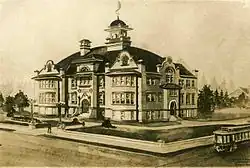James John High School
James John High School was a public high school in the city of St. Johns, Oregon that later became part of Portland Public Schools after St. Johns was annexed to Portland in 1915. The school opened in 1911 and had four students in its first graduating class. It closed in 1923 after the completion of its replacement, Roosevelt High School. It was named for James John, the founder of the St. Johns settlement.
| James John High School | |
|---|---|
 | |
| Location | |
| Information | |
| Opened | 1911 |
| Closed | 1923 |
History
Construction of James John High School began in Fall 1909. The building was completed in September 1910 at a cost $40,000 ($1,256,286 adjusted for inflation).[1] In the school's first year, men's and women's basketball teams were formed.[2] There were four students in the first graduating class in 1911.[3] Other events at the school in 1911 included a meeting of the Multnomah County Teachers Institute[4] and the formation and regular meetings of the St. Johns Commercial Club (starting on November 13).[5]
In 1915, the James John High School athletic teams joined the Portland Interscholastic League[6] following the annexation of the St. Johns School District to Portland Public Schools.[7] The following year, James John graduated the largest class in its history, with 22 students receiving diplomas.[8]
The school was temporarily closed in 1920 after it was condemned as unsafe.[9] Students were sent to Jefferson High School during the school's rebuilding.[10] The Portland City Council began searching for a new location for an updated James John High School, since the old school was not adequate.[11] The new school was planned to be named James John High School,[12][13][14] but following in the theme of other Portland high schools built in the era, it was named Roosevelt High School and dedicated in 1922.[15] James John students moved to the completed Roosevelt High School building in January 1923.[16] The old school building was gutted by fire in September 1934 after sitting vacant for a number of years.[17] The building had been used to house grade school children until the present James John Elementary School was opened in 1929.
References
- "Suburb is growing". The Sunday Oregonian. 18 September 1910. Sec. 4, p. 7.
- "James John school winner". The Sunday Oregonian. 5 March 1911. Sec. 2, p. 2.
- "St. Johns graduates 4". The Morning Oregonian. 26 June 1911. p. 14.
- "County teachers meet". The Morning Oregonian. 28 November 1911. p. 13.
- "St. Johns citizens form". The Morning Oregonian. 14 November 1911. p. 12.
- "8 teams in league". The Morning Oregonian. 8 December 1915. p. 14.
- Polich, Edward L. (1950). A history of Portland's secondary school system with emphasis on the superintendents and the curriculum (PDF) (M.A. thesis). University of Portland. p. 82. OCLC 232551057.
- "James John class is biggest in its history". The Sunday Oregonian. 18 June 1916. Sec. 3, p. 11.
- "James John High School building will be made safe by October 15". The Sunday Oregonian. 5 September 1920. Sec. 1, p. 14.
- "Teachers who quit suddenly, warned". The Morning Oregonian. 27 August 1920. p. 10.
- "44 teachers named to fill vacancies". The Morning Oregonian. 2 September 1920. p. 6.
- "School Building Begun: New James John High Structure to Cost $240,000". The Sunday Oregonian. 18 December 1921. Sec. 1, p. 19.
- "James John site picked by Board". The Morning Oregonian. 11 February 1921. p. 4.
- "James John honors memory of notables". The Sunday Oregonian. 6 November 1921. Sec. 5, p. 6.
- "City Dedicates New High School". The Sunday Oregonian. 25 June 1922. Sec. 1, p. 1.
- "James John High School Moves to Roosevelt Building". The Sunday Oregonian. 28 January 1923. Sec. 5, p. 8.
- "Abandoned school at St. Johns burns". The Sunday Oregonian. 23 September 1934. Sec. 1, p. 16.
External links
- St. Johns Review written by James John High School students (November 13, 1914 issue)
- "The History of James John High School" – St. Johns Heritage Association